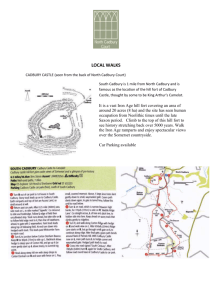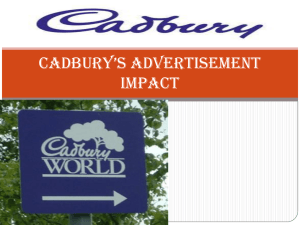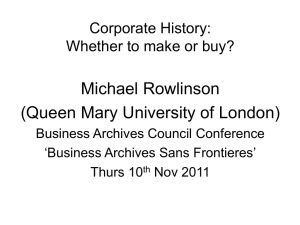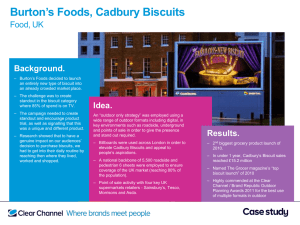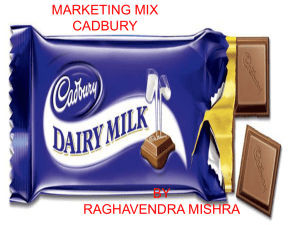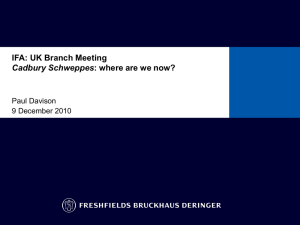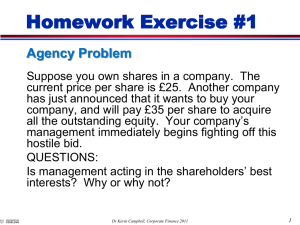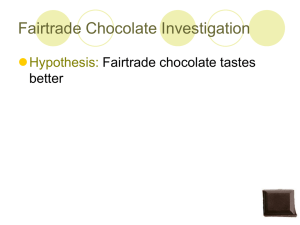Local MP (for Bournville)
advertisement
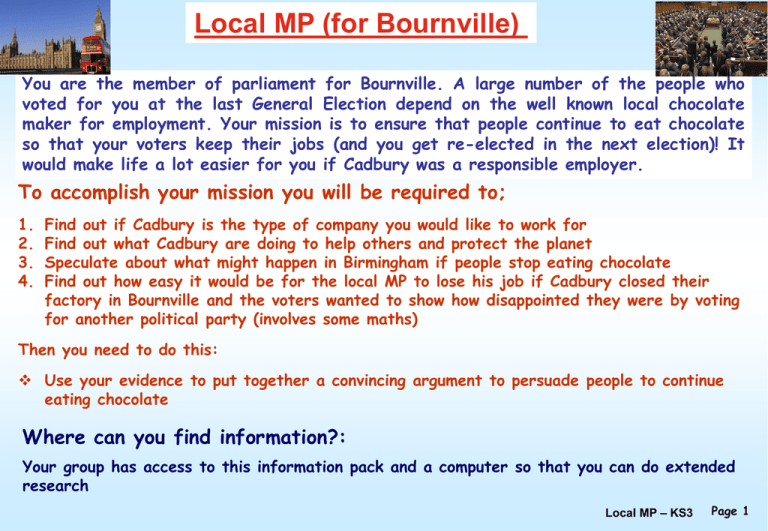
Local MP (for Bournville) You are the member of parliament for Bournville. A large number of the people who voted for you at the last General Election depend on the well known local chocolate maker for employment. Your mission is to ensure that people continue to eat chocolate so that your voters keep their jobs (and you get re-elected in the next election)! It would make life a lot easier for you if Cadbury was a responsible employer. To accomplish your mission you will be required to; 1. 2. 3. 4. Find out if Cadbury is the type of company you would like to work for Find out what Cadbury are doing to help others and protect the planet Speculate about what might happen in Birmingham if people stop eating chocolate Find out how easy it would be for the local MP to lose his job if Cadbury closed their factory in Bournville and the voters wanted to show how disappointed they were by voting for another political party (involves some maths) Then you need to do this: Use your evidence to put together a convincing argument to persuade people to continue eating chocolate Where can you find information?: Your group has access to this information pack and a computer so that you can do extended research Local MP – KS3 Page 1 1. Find out if Cadbury is the type of company you would like to work for Cadbury's as we know it today started from humble beginnings in Bull Street, Birmingham. A shop was opened by John Cadbury in 1824. It did not start as a confectionery shop but sold tea and coffee and home made drinking chocolate or cocoa which he made himself for his customers. In the early 1840's Cadbury moved to a factory in Bridge Street, Birmingham – the Cadbury as we know it was now born. John Cadbury retired in 1861 and the business was taken over by George and Richard Cadbury – making sure that it stayed in the family. When George (together with his brother Richard) took over the business from their father, business was bad. The public would not drink chocolate. It was too bitter! To remedy this George heard that a Dutch chocolate manufacturer had invented a machine to press out the cocoa butter and 'I went off to Holland without knowing a word of Dutch,' he said, 'saw the manufacturer with whom I had to talk entirely by signs and a dictionary and bought the machine.' So it was that in 1866 Cadbury's put on the market the first pure cocoa essence that tasted sweet. Business soon boomed. Tablets of chocolate as well as drinking chocolate were manufactured. But George Cadbury cared for more than business. Every Sunday – his one day off - he set off at 6.30 a.m. to take Class 14 in the newly formed Adult School. He took a flower for each member of his class. In true Quaker style, all were treated as equals, though many were down-and-outs. All kinds of Christians joined in. Reading and writing came first on the programme and Bible study followed. Each day in the Cadbury factory began with Bible reading and prayers for all. But no one could call the Cadbury brothers hypocrites. Their Christianity never stopped at fine words. In an age when most factory owners were interested in making money and didn’t care about conditions for their workers, building very small houses which soon became slums, George believed in providing first-class facilities. (information continued on next page) Local MP – KS3 Page 2 1. Find out if Cadbury is the type of company you would like to work for (continued) When the factory in Bridge Street became too small, George decided to build a factory in the country. The brothers bought a site a few miles out of Birmingham in 1878, which they called 'Bournville'. George loved open spaces. He provided football fields, a playground and a garden with a lily pond. Inside, there were warm cloakrooms for drying off wet clothes and a warming cupboard for the workers to heat their own food. But working out of town presented transport problems. George decided to buy land round the factory and build a village for his workforce. Every house would have a spacious garden big enough to grow vegetables. Fruit trees were planted and the garden dug over before each new owner moved in. Trees were planted along the wide roads. Later, George Cadbury built schools and a shopping area. George Cadbury himself said: ‘Why should an industrial area be squalid and depressing? Why shouldn’t the industrial worker enjoy country air without being separated from his work? If the country is a good place to live in, why not to work in?‘ During World War I (1914 – 18), more than 2,000 of Cadbury’s male employees joined the Armed Forces. Cadbury supported the war effort, sending warm clothing, books and chocolate to the soldiers. Cadbury supplemented the government allowances to the dependants of their workers. When the workers returned, they were able to return to work, take educational courses, and injured or ill employees were looked after in care homes. Loyal and hard-working workers were treated with great respect and relatively high wages and good working conditions; Cadbury also pioneered pension schemes, joint works committees and a full staff medical service. The Cadburys were particularly concerned with the health and fitness of their workforce, incorporating park and recreation areas into the Bournville village plans and encouraging swimming, walking and indeed all forms of outdoor sports. In the early 1920s, extensive open lands were purchased and laid as football and hockey pitches together with a grassed running track. There were also sports playing fields, several bowling greens, a fishing lake and an outdoor swimming pool. (information continued on next page) Local MP – KS3 Page 3 1. Find out if Cadbury is the type of company you would like to work for (continued) In the last 30 years Cadbury has opened factories all over the world - Australia, New Zealand, Malaysia, India, Indonesia, Japan and several countries in Africa. Cadbury's chocolate is sold all over North America and in Europe. Recent developments included new factories in China and Poland. Many countries also receive their Cadbury's chocolates straight from Bournville, making it a worldwide success story. Nationally, and even globally, the affection for the company's products stems in part from the fact that they are closely associated with childhood memories. Locally, it is the legacy that George Cadbury created that makes the residents of Bournville feel as though the company belongs to them. George Cadbury's care for the workforce may not be as evident today but it is still seen as a fine company to work for where people receive a fair reward for their efforts. DID YOU KNOW? The name Bournville is made up from 2 words – Bourn (from the local river) and ville (the French word for ….(well it’s up to you to find out!). Why French – because France was strongly associated with high class chocolate. Suggested tasks: 1) Produce a timeline showing Cadbury’s long history 2) Produce a poster explaining why Cadbury has won a special place in many people’s hearts 3) Find out how far Bournville is from Redditch and mark our school and Bournville on a map; this may help you convince people that Cadbury really is a local company 4) Find out what the French word ‘ville’ means 5) The Cadbury family were Quakers - find out more about Quakers Local MP – KS3 Page 4 2. Find out what Cadbury are doing to help others and protect the planet 1) Carbon dioxide is a green house gas that is widely accepted to be causing the planet to get warmer. Cadbury have recognised that their factories and transport operations are contributing to the problem by producing more of these gases and are committed to reducing their carbon footprint. They are investing in new, efficient equipment for services needed to make their products such as steam, hot water, compressed air, lighting and refrigeration. This new equipment uses less electricity and as a consequence reduces the amount of carbon dioxide produced at power stations. What may come as a surprise is that 60% of the carbon footprint of a bar of milk chocolate is associated with the production of milk on farm, including methane emissions from cows! That’s why, in February 2009, Cadbury launched the Dairy Guide to Low Carbon Dairy Farming, working in partnership with the Selkley Vale farmers to reduce the damaging environmental impact of dairy farming. 2) Water is a scarce commodity and Cadbury have looked at ways to reduce water consumption. Their cocoa processing site at Chirk uses water in a number of areas, such as, in steam used during processing and for cleaning. The site has now invested in equipment so that they can recycle water which is having a really positive impact on the environment. 3) Fairtrade Cadbury Dairy Milk has been available in the UK and Ireland since July 2009. Fairtrade Cadbury Dairy Milk is also now available in Australia and New Zealand and soon to be in Canada. In total, 350 million Cadbury Dairy Milk bars will carry the Fairtrade Mark each year around the world. The move has quadrupled the amount of Fairtrade cocoa coming out of Ghana, compared with 2008, and will benefit more than 40,000 farmers. Following the groundbreaking move to be the first mainstream confectionery brand to carry the Fairtrade Mark, Cadbury has announced the investment plans for its first Fairtrade social premium to cocoa farmers in Ghana. The first instalment of £500,000 will go into programmes include building wells and mobile health clinics and funding for carbon reduction schemes. Alongside the community investment, the money is also being used to fund farmer training, incentives and provision of tools. (information continued on next page) Local MP – KS3 Page 5 2. Find out what Cadbury are doing to help others and protect the planet (continued) 4) Easter is a great time for chocolate companies and the companies that make packaging materials (wrappers obviously cannot be eaten!!). In 2008 Cadbury launched an Eco Egg range wrapped simply in foil. Reductions in packaging have ranged from 39% to 68% and have meant that there are 2,290 fewer Cadbury lorry loads on the road which means that less oil is being used (and remember that when all the oil has gone it cannot be replaced). 5) Cadbury are working directly with cacao bean farmers to help improve their standard of living. They are helping to improve farmer incomes by helping farms to increase their yields and the quality of their beans. Other ideas include helping farmers to grow other crops and assist with building wells for clean, safe water; education, through schools and libraries; and the environment through bio-diversity projects. 6) Cadbury was the Official Confectionery Supporter for London 2012!! This means that they worked with the London Organising Committee of the Olympic Games and Paralympic Games (LOCOG) and the Government to ensure that the London 2012 Games engaged with and touched people wherever Cadbury operates in the UK. 7) Cadbury believe that their products are treats to be enjoyed appropriately as part of a balanced diet and an active and healthy lifestyle. They have a strict global marketing code which means that they do not market to young children in the UK, they have not advertised during any children’s programming for many years. Suggested tasks: 1) Use the information in this section to create a poster/collage showing all (or some) of the actions that Cadbury are taking to help others and protect the planet; use this to help explain how caring Cadbury are and how they would be missed if people stopped eating chocolate and they had to close down 2) Design the wrapper for a special edition version of Cadbury Dairy Milk that shows how they are helping others (you could launch this ‘new product’ as part of your presentation 3) Find out more about FairTrade 4) Find out more about the partnership with the Selkley Vale farmers Local MP – KS3 Page 6 3. Speculate about what might happen in Birmingham if people stop eating chocolate If people stop eating chocolate the Bournville factory will likely disappear together with at least 2,500 jobs at the factory. Closure of the factory would be a huge blow to the local economy, a large number of the residents would have less money to spend and shops would suffer from a loss of business. Many hundreds of other people would also lose their jobs. It is not only the financial cost of unemployment that is of concern, many people find it difficult to adjust emotionally to being told that they no longer have a job. In this situation loss of self esteem can lead to depression and other mental health issues. Many of those who could lose their jobs would have to re-train so that they master new skills that other employers may be able to use. The impact of stopping eating chocolate would be felt far beyond Bournville and Birmingham. Factories making candy and gum might remain open but the other UK factories in Leominster and Chirk, plus numerous other sites around the world would probably have to close. Cadbury’s efforts to help people and protect the planet would have to be significantly reduced. Dozens of well-known manufacturers, including Rover, HP Sauce and Dunlop, have closed or pulled out of Birmingham over the last few years – it’s your mission to make sure that it doesn’t happen to Cadbury! Read what two people say about being unemployed on the next page. (information continued on next page) Local MP – KS3 Page 7 3. Speculate about what might happen in Birmingham if people stop eating chocolate (continued) ‘I spent nine years working for British Gas and in July last year I was made redundant. I've been calling job agencies three times a week to see if there is any work, but the agencies themselves are getting nothing in. I have sent application forms to lots of companies and I've not heard a thing back from any of them. I'd rather not go onto benefits - too much pride! - but I went to the Jobcentre and there is nothing for me there. I am either under qualified or have the wrong skills. The other thing is that most of the jobs are paying minimum wage, or just above it and with a mortgage to pay I'm not sure how that would work out. I've been really careful with the redundancy payment that I got last year, but I have had to dip into some savings to pay the mortgage and meet the bills. ‘I first got laid off in December 2011, and in January I went back to work for a previous employer but was laid off again in July. I've looked long and hard for work in my area of expertise, and there is just nothing there. I've started looking at a change of direction to something completely different. I've applied for a job with Sainsbury's as an assistant warehouse manager because I simply need to get something, but it's paying around £30,000 a year less than I was earning before. With two young children and a big mortgage the sums just don’t add up. I'm trying to keep an open mind and I keep telling myself things are going to get better, but I do still get depressed. I am supposed to be getting married on New Year's Eve, but there is every chance we will need to delay our plans’. Suggested tasks: 1) The clipart show a poor man standing outside the factory that he used to work in. He is hoping that people will give him money (hence the cap) so that he can pay his bills. Create your own clipart pictures that show what it may be like for workers at Bournville if the factory closed. 2) Write your own ‘emotional’ case study or poem that you can use to encourage people to continue eating chocolate so that the factory stays open. Local MP – KS3 Page 8 4. Find out how easy it would be for the local MP to lose his job if Cadbury closed their factory in Bournville and the voters wanted to show how disappointed they were by voting for another political party Bournville lies within the constituency of Selly Oak in South Birmingham. The seat was held by Steve McCabe for the Labour party in the last general election on a much reduced majority. The % share of the vote for each of the political parties contesting the seat are shown in the table below. You will also need to know that of the 74,860 people who could have voted that only 62.2% actually did vote. Remember that the %s in the table above are based on the total number of people that actually voted. Suggested tasks: 1) Use the information in the table to work out Steve McCabe’s majority (how many votes he won by) at the last general election. Your first step will have to be working out how many people actually voted. 2) Use your answer to speculate what might happen if 5,000 people decided to vote for a different political party – would he lose his job! If so he might work even harder to keep the factory open! Local MP – KS3 Page 9
